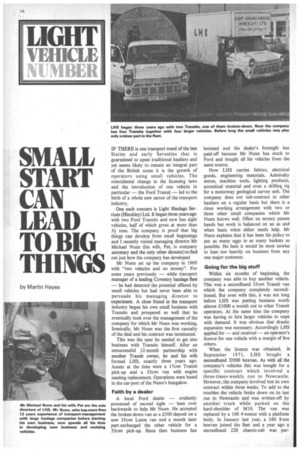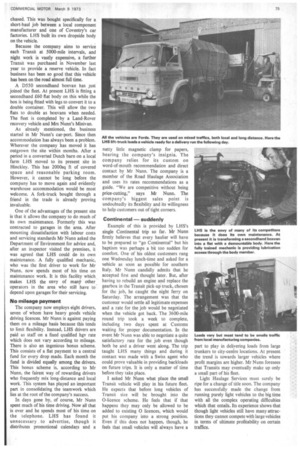SMALL • START CAN LEAD TO BIG THINGS
Page 76

Page 77

If you've noticed an error in this article please click here to report it so we can fix it.
by Martin Hayes
IF THERE is one transport trend of the late Sixties and early Seventies that is guaranteed to upset traditional hauliers and yet seems likely to remain an integral part of the British scene it is the growth of• operators using small vehicles. The coincidental change in the licensing laws and the introduction of one vehicle in particular — the Ford Transit — led to the birth of a whole new sector of the transport industry.
One such concern is Light Haulage Services (Hinckley) Ltd. It began three years ago with two Ford Transits and now has eight vehicles, half of which gross at more than 3+ tons. The company is proof that big things can develop from small beginnings and I recently visited managing director Mr Michael Nunn (his wife, Pat, is company secretary and the only other director) to find Out just how the company has developed Mr Nunn set up the company in 1969 with "two vehicles and no money". For some years previously — while transport manager of a leading Coventry haulage fleet — he had detected the potential offered by small vehicles but had never been able to persuade his managing director to experiment. A close friend in the transport industry began his own small business with Transits and prospered so well that he eventually took over the management of the company for which Mr Nunn was working. Ironically, Mr Nunn was the first casualty of the deal and his contract was terminated.
This was the spur he needed to get into business with Transits himself. After an unsuccessful ,12-month partnership with another Transit owner, he and his wife formed LHS, exactly three years ago. Assets at the time were a 17cwt Transit pick-up and a 35cwt van with engine needing replacement. Operations were based in the car-port of the Nunn's bungalow.
Faith by a dealer A local Ford dealer — evidently possessed of second sight — bent over backwards to help Mr Nunn. He accepted the broken-down van as a £500 deposit on a new 35cwt Luton van and a month later part-exchanged the other vehicle for a 35cwt pick-up. Since then business has boomed and the dealer's foresight has paid-off because Mr Nunn has stuck to Ford and bought all his vehicles from the same source.
Now LHS carries fabrics, electrical goods, engineering materials, Admiralty stores, machine tools, lighting products, acoustical material and even a drilling rig for a motorway geological survey unit. The company does not sub-contract to other hauliers on a regular basis but there is a close working arrangement with two or three other small companies which Mr Nunn knows well. Often no money passes hands but work is balanced on an as and when basis when either needs help. Mr Nunn explains that it has been his policy to put as many eggs in as many baskets as possible. He feels it would be most unwise to lean too heavily on business from any one major customer.
Going for the big stuff
Within six months of beginning, the company was able to buy another vehicle. This was a secondhand 35cwt Transit van which the company completely reconditioned. But even with this, it was not long before LHS was putting business worth almost £1000 a month out to other Transit operators. At the same time the company was having to hire larger vehicles to cope with demand. It was obvious that .drastic expansion was necessary. Accordingly LHS applied for — and received — an operator's licence for one vehicle with a margin of five others.
When the licence was obtained,. in September 1971, LHS bought a secondhand D500 boxvan. As with all the company's vehicles this was bought for a specific contract which involved a three-times-weekly run to Newcastle. However, the company involved lost its own contract within three weeks. To add to the troubles the vehicle broke down on its last run to Newcastle and was written-off by another truck while parked on the hard-shoulder of M18. The van was replaced by a 16ft 4-tonner with a platform body. In January last year, a 24ft 8-ton boxvan joined the fleet and a year ago a secondhand 22ft chassis-cab was pur chased. This was. bought specifically for a short-haul job between a local component manufacturer and one of Coventry's car factories. LHS built its own dropside body on the vehicle.
Because the company aims to service each Transit at 5000-mile intervals, and night work is vastly expensive, a further Transit was purchased in November last year to provide a reserve vehicle. In fact business has been so good that this vehicle has been on the road almost full time.
A D550 secondhand boxvan has just joined the fleet. At present LHS is fitting a secondhand £60 flat body on this while the box is being fitted with legs to convert it to a double container. This will allow the two flats to double as boxvans when needed. The fleet is completed by a Land-Rover recovery vehicle and Mrs Nunn's Minivan.
As already mentioned, the business started in Mr Nunn's car-port. Since then accommodation has always been a problem. Wherever the company has moved it has outgrown the site within months. After a period in a converted Dutch barn on a local farm LHS moved to its present site in Hinckley. This has 2000sq ft of covered space and reasonable parking room. However, it cannot be long before the company has to move again and evidently warehouse accommodation would be most welcome. A fork-truck bought through a friend in the trade is already proving invaluable.
One of the advantages of the present site is that it allows the company to do much of its own maintenance. Formerly this was contracted to garages in the area. After mounting dissatisfaction with labour costs and servicing standards Mr Nunn asked the Department of Environment for advice and, after an inspector visited the premises, it was agreed that LHS could do its own maintenance. A fully qualified mechanic, who was the first driver to work for Mr Nunn, now spends most of his time on maintenance work. It is this facility which makes LHS the envy of many, other operators in the area who still have to k depend upon garages for their servicing.
No mileage payment
The company now employs eight drivers, seven of whom have heavy goods vehicle driving licences. Mr Nunn is against paying them on a mileage basis because this tends to limit flexibility. Instead, LHS drivers are paid as staff on a fixed qualified hgv rate which does not vary according to mileage. There is also an ingenious bonus scheme. This consists of a flat payment to a central fund for every drop made. Each month the fund is divided equally among the drivers. This bonus scheme is, according to Mr Nunn, the fairest way of rewarding drivers who frequently mix long-distance and local work. This system has played an important part in consolidating the teamwork which lies at the root of the company's success.
In days gone by, of course, Mr Nunn spent much of his time driving. Now all that is over and he spends most of his time on the telephone. LHS has found it unnecessary to advertise, though it distributes promotional calendars and a natty little magnetic clamp for papers, bearing the company's insignia. The company relies for its custom on word-of-mouth recommendation and direct contact by Mr Nunn. The company is a member of the Road Haulage Association and uses its rates recommendations as a guide. "We are competitive without being price-cutting," says Mr Nunn. The company's biggest sales point is undoubtedly its flexibility and its willingness to help customers out of tight corners.
Continental — suddenly
Example of this is provided by LHS's single Continental trip so far. Mr Nunn firmly believes that every haulier will have to be prepared to "go Continental" but his baptism was perhaps a bit too sudden for comfort. One of his oldest customers rang one Wednesday lunch-time and asked for a uehicle as soon as possible for southern Italy. Mr Nunn candidly admits that he accepted first and thought later. But, after having to rebuild an engine and replace the gearbox in the Transit pick-up truck, chosen for the job, he caught the night ferry on Saturday. The arrangement was that the customer would settle all legitimate expenses and a rate for the job would be negotiated when the vehicle got back. The 3600-mile round trip took a week to complete, including two days spent at Customs waiting for proper documentation. In the event Mr Nunn was able to negotiate a quite satisfactory rate for the job even though both he and a driver went along. The trip taught LHS many things and during it contact was made with a Swiss agent who could prove valuable in providing backloacis on future trips. It is only a matter of time before they take place.
I asked Mr Nunn what place the small Transit vehicle will play in his future fleet. He expects that before long vehicles of Transit size will be brought into the 0-licence scheme. He feels that if that happens they may only be allowed to be added to existing 0 licences, which would put his company into a strong position. Even if this does not happen, though, he feels that small vehicles will always have a
part to play in delivering loads from large trunkers to city-centre locations. At present the trend is towards larger vehicles where profit margins are higher. Mr Nunn foresees that Transits may eventually make up only a small part of his fleet.
Light Haulage Services must surely be ripe for a change of title soon. The company has successfully made the change from running purely light vehicles to the big time with all the complex operating difficulties which that entails. Its experience shows that though light vehicles still have many attractions they cannot compete with large vehicles in terms of ultimate profitability on certain traffics.




















































































































































